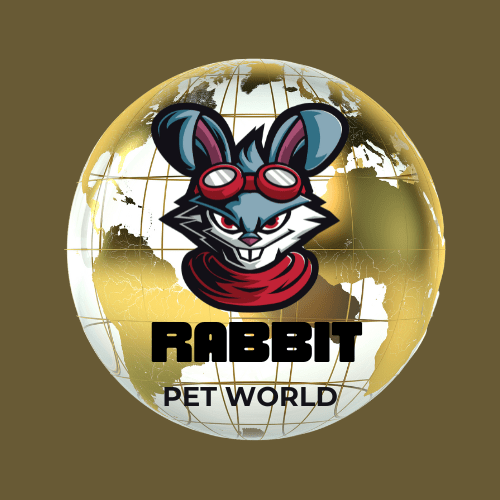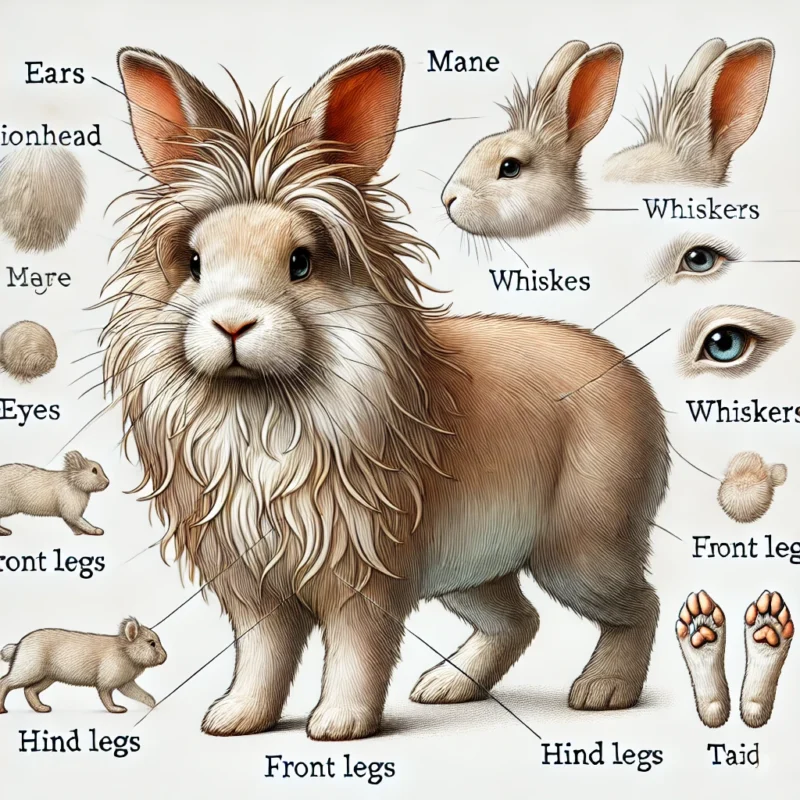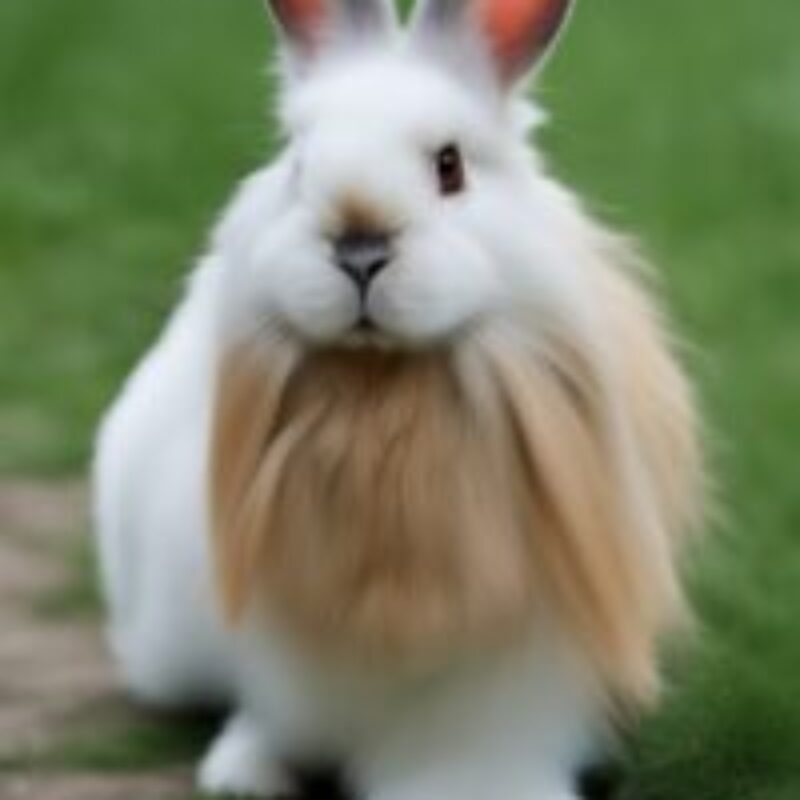Together, we discover the fascinating world of Lionhead rabbits! We will learn about their uniqueness and history, care tips, and why they make the perfect fluffy companions.
- Debunking the "All Rabbits Are the Same": Why Lionhead Rabbits:
- 2. The Unique History and Origin of Lionhead Rabbits:
- Popularity starts for Lionhead rabbits:
- 3. What distinguishes male and female Lionhead Rabbits from one another?
- Which one is for you, male or female Lionhead rabbits?
- Lionhead Rabbits characteristics chart:
- Some Unknown Secrates about Lionhead Rabbits:
- Lionhead Rabbit Personalities Compare Against Other Rabbit Breeds:
- Lionhead Rabbits & other Rabbits comparison chart:
- Lionhead pet rabbit's vocalizations and noises Meanings:
- Health is Wealth Considerations for Lionhead Rabbits:
- The Fluffy Duty of Caring for Your Lionhead Rabbit:
- Making a Sweet Bunny Home for your Sweet Lionhead Rabbit:
- Lionhead Rabbit Training: Yes, You Can Train a Bunny!:
- There are some pros & cons to having lionhead Rabbits:
- FAQs (Your Top Questions Answered):
Debunking the “All Rabbits Are the Same”: Why Lionhead Rabbits:
Whether you are just curious about this unique breed or you are planning to adopt this beautiful pet friend, this blog post has everything you need to know to get familiar with these quirky, cute, and fluffy pets!
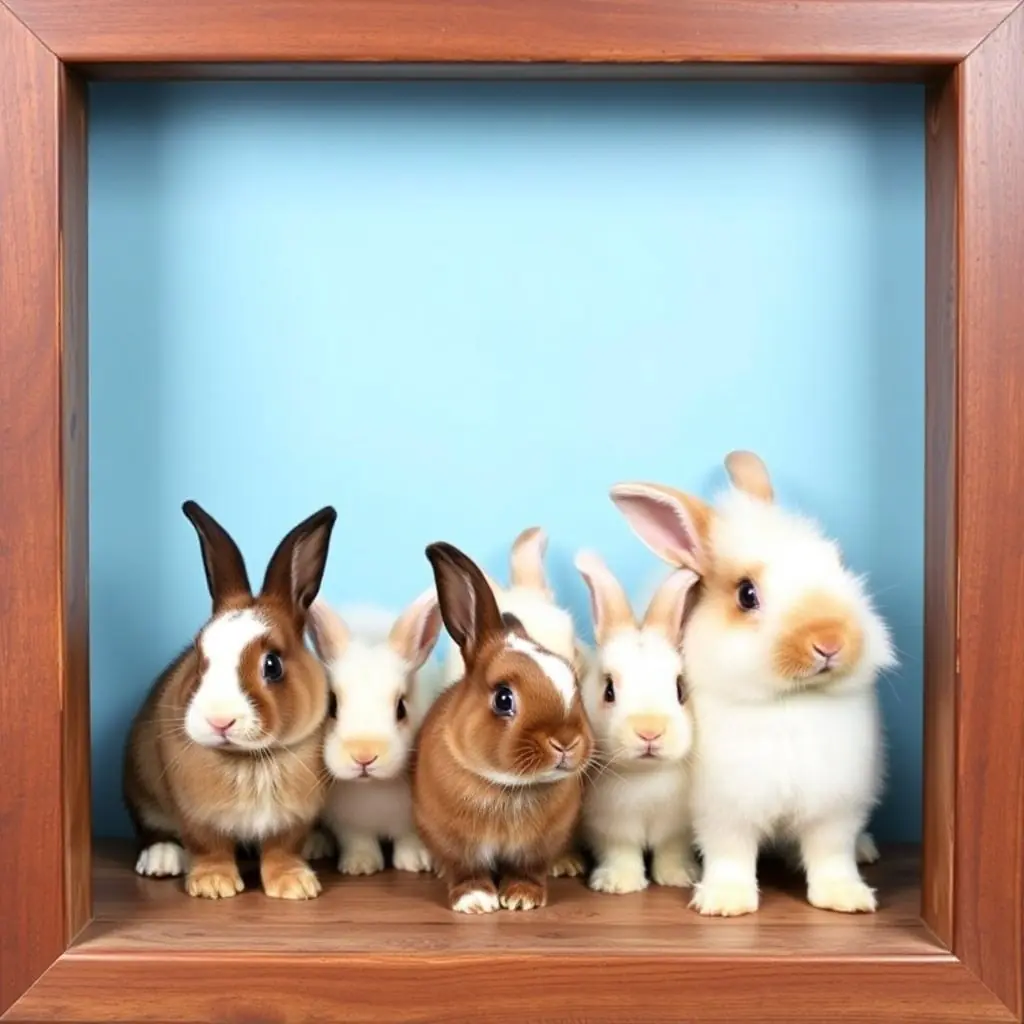
2. The Unique History and Origin of Lionhead Rabbits:
Lionhead rabbits are a fascinating breed that is known for their extraordinary, fluffy mane around the head, which resembles a lion’s majestic appearance. This comparatively new breed has a fascinating history that began in Belgium in the 1990s.
Breeders initially desired to create a rabbit breed with a unique fur pattern and texture by crossing Swiss Fox rabbits, which are known for their dense, long fur, with Netherland dwarfs, which are known for their compact, small size. The trademark mane characteristic of Lionhead rabbits results from a genetic alteration known as the “mane gene.” This gene results in woolly fur rings around the rabbit’s head and sometimes on its flanks.
Depending on their genetic makeup, Lionhead rabbits may have single or double manes, with the double-maned variety displaying a more prominent and striking fur halo.
Popularity starts for Lionhead rabbits:
Surprisingly, at the initial stage of the Lionhead rabbit breed, it became popularized in Europe very soon. But this breed’s destination for international recognition has been obtained for a long time. At the beginning of the 2000s, the British breeders worked on refining the lionhead’s traits and characteristics, which resulted in BRC officially recognizing this breed.
The Lionhead rabbit’s growing appeal eventually crossed the Atlantic, and in 2014, the American Rabbit Breeders Association (ARBA) officially acknowledged the breed, solidifying its status as a beloved pet and show rabbit.
Nowadays, Lionhead rabbits are the first choice of most breeders; they recommend this rabbit family because of their playful characteristics and friendly temperament, manageable size, and unique appearance. Thanks to distinguished breeders’ consistent efforts, they found this fascinating blend of genetics.
Credit goes to breeders and their endless efforts. The lionhead rabbit breed is a lovely and unique choice for pet rabbit lovers and families looking for a loving pet rabbit friend. Their history is a testament to the creativity and dedication of breeders who sought to create a truly unique and endearing rabbit breed.
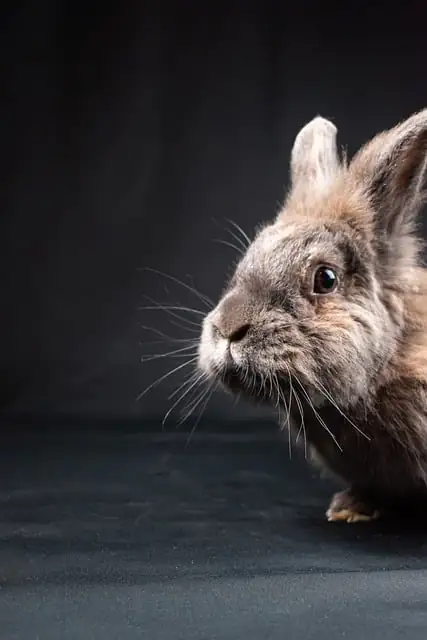
3. What distinguishes male and female Lionhead Rabbits from one another?
Lionhead rabbits, male (traditional breeder called a buck) and female (traditionally called a doe), have many characteristics, including their beautiful appearance and kind disposition. However, their behaviour, care necessities, and personality characteristics differ significantly.
i. Physical Differences between Male & Female Lionhead Rabbits:
- Male & Female Sizes: Male Lionhead rabbits (bucks) are usually slightly smaller than females (doe), although the size difference may be marginal in some cases. Male rabbits weigh 2.5 to 3.5 pounds, and female rabbits weigh 2.5 to 3.75 pounds.
- Head Shape of Male & Female: Lionhead Bucks-head structures have a rounder and broader head shape, and on the other hand, lionhead females tend to have slightly narrower and more streamlined heads.
- Genital appearance: Examining their genital area is the most reliable method of determining their sex. While female Lionhead rabbits have a vulva that resembles a slit, male Lionhead rabbits have a penile hole that is visible.
ii. Behavioral Differences among Bucks and Doe Lionhead Rabbits:
- Temperament: In general, bucks Lionheads are friendlier and more relaxed. They are less territorial and frequently like interacting with people. Doe lionheads have the potential to be somewhat more possessive, particularly when they are not spayed. They might defend their territory or engage in nesting behaviours at specific times
- Territorial Behavior: Female Lionhead rabbits that have not been spayed are more prone to mark their territory with droppings and urine. Although neutering can significantly lessen this activity, male Lionheads, especially those that are not neutered, may also spray pee.
- Social Traits: Mr. Rabbits is usually more outgoing and social, while Miss. Rabbits may be more independent or reserved.
iii. Care and Reproductive Differences Lionhead Rabbits:
- Reproductive Behaviors: The female lionhead rabbits may exhibit mood swings, digging, or nesting as a result of hormonal changes. These behaviors can be stopped, and general health can be enhanced with proper care. Male Lionheads, known as bucks, may display mounting behavior and be more likely to spray urine as a demonstration of dominance or ready for mating if they feel unneutered.
- Health Concerns: Spaying is a crucial health factor since female rabbits who are not spayed risk acquiring uterine cancer. Bucks should still be neutered for behavioural reasons, even though they often have low reproductive health issues.
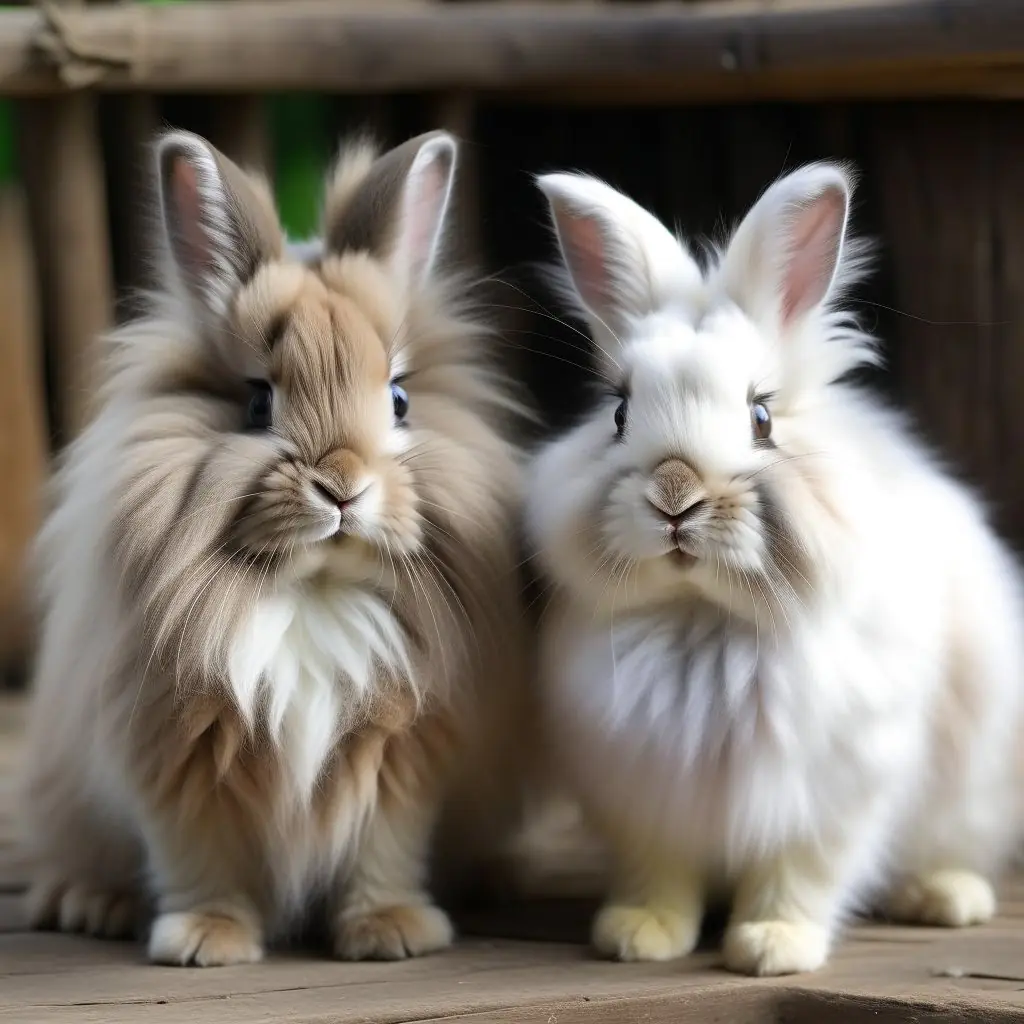
Which one is for you, male or female Lionhead rabbits?
Both male and female Lionhead rabbits have the ability to be wonderful pets. Spaying or castrating can help reduce hormonal behaviours and make them easier to care for and handle. Therefore, a neutered male might suit you best when you are looking for a highly relaxed and cuddly rabbit. A spayed female could be an ideal choice for those Lionhead lovers seeking an independent yet loving companion.
Lionhead Rabbits characteristics chart:
| LionhedRabbit Family | Size | Weight (lbs) | Color Variations | Body Structure | Mane Type | Breed Type |
| Single-Maned Lionhead | Small | 2.5 – 3.5 | Wide variety, including white, black, chocolate, blue, tortoise, agouti, and more | Compact, round body | Single mane (less prominent, around the head) | Single-Maned Lionhead |
| Double-Maned Lionhead | Small | 2.5 – 3.5 | Commonly includes shades of white, cream, grey, or a mix | Compact, round body with flanks | Double mane (prominent, thicker, extends to shoulders and flanks) | Double-Maned Lionhead |
| Teddy Lionhead | Small Meduim | 3.0 – 4.5 | Solid colours (black, blue, white) or patterns (broken, tortoise) | Slightly elongated, leaner body | Double mane with dense fur resembling a teddy bear | Teddy Lionhead |
| Dwarf Lionhead | Very Small | 1.5 – 2.5 | Typically in solid white, grey, or fawn shades | Petite and compact, shorter ears | Single or double mane, depending on genetics | Dwarf Lionhead |
| Angora Lionhead | Meduim | 4.0 – 6.0 | Harlequin patterns: alternating bands of colour (orange, black, or gray | Slightly elongated with dense woolly fur | Very thick double mane; fur extends over most of the body | Angora Lionhead |
| Harlequin Lionhead | Small to Meduim | 3.0 – 4.0 | Solid or broken colors, including black, chestnut, sable, or otter | Compact but slightly arched | Double mane with patterned fur | Harlequin Lionhead |
| Mini Lion Lop | Small | 2.5 – 3.5 | Solid or broken colors including black, chestnut, sable, or otter | Lop-eared with a compact, muscular build | Single or double mane | Solid or broken colors, including black, chestnut, sable, or otter |
Some Unknown Secrates about Lionhead Rabbits:
These unknown historical tidbits highlight the Lionhead rabbit’s fascinating journey from an accidental discovery to a beloved pet worldwide.
i. The Story of Mane Gene of Lionhead Rabbits Was an Accidental Discovery:
The breeders are working on creating a small rabbit breed; initially, but accidently, they found the characteristic mane of the lionhead rabbit.
However, the famous “mane gene” was discovered by chance when breeders crossed Swiss Fox rabbits and Netherland dwarfs to produce a dwarf breed rabbit with distinctive fur textures. But the result surprised the breeders and the world of rabbit lovers, and everyone welcomed this iconic lionhead appearance.
ii. The Name Reflects Its Royal Appearance, Lionhead Bunnies:
Because of its lion-like features, especially its mane, the Lionhead rabbit gets its name. The breed’s popularity was aided by its regal appellation, particularly among breeders and pet buyers seeking a rabbit with an exotic edge and a striking appearance.
iii. Early Breed Standards Were Inconsistent:
Lionhead rabbits’ journey to recognition is not very easy; credit goes to European breeders, who worked hard years refining this breed to become up to the standards of pet rabbits. The rabbit breeders’ efforts bore fruit in the 2000s when the British Rabbit Council (BRC) recognized this new lionhead rabbit breed and later on in 2014 by the American Rabbit Breeder Association (ARBA).
iv. Double and Single-Mane Lionhead Rabbit Came From Selective Breeding:
Lionhead rabbits could be double mane or single mane because of their genetic makeup. More fur around their flanks indicates that it is a double-maned lionhead rabbit, and less pronounced mane indicates it is a single-maned lionhead. Point to remember: this distinction was not part of the initial breeding plan but evolved through more selective breeding tactics.
v. Gaining popularity is not simple for Lionhead rabbits:
In the beginning, the lionhead rabbit breed faced criticism among breeders because of its unique fur and genetic variations. But the playful and gentle nature, with the combined striking appearance of the lionhead rabbit, led to these characteristics of the lionhead bunny winning the hearts of pet rabbit lovers and breeders all over the world. Present day, this rabbit breed has a unique position in the rabbit family.
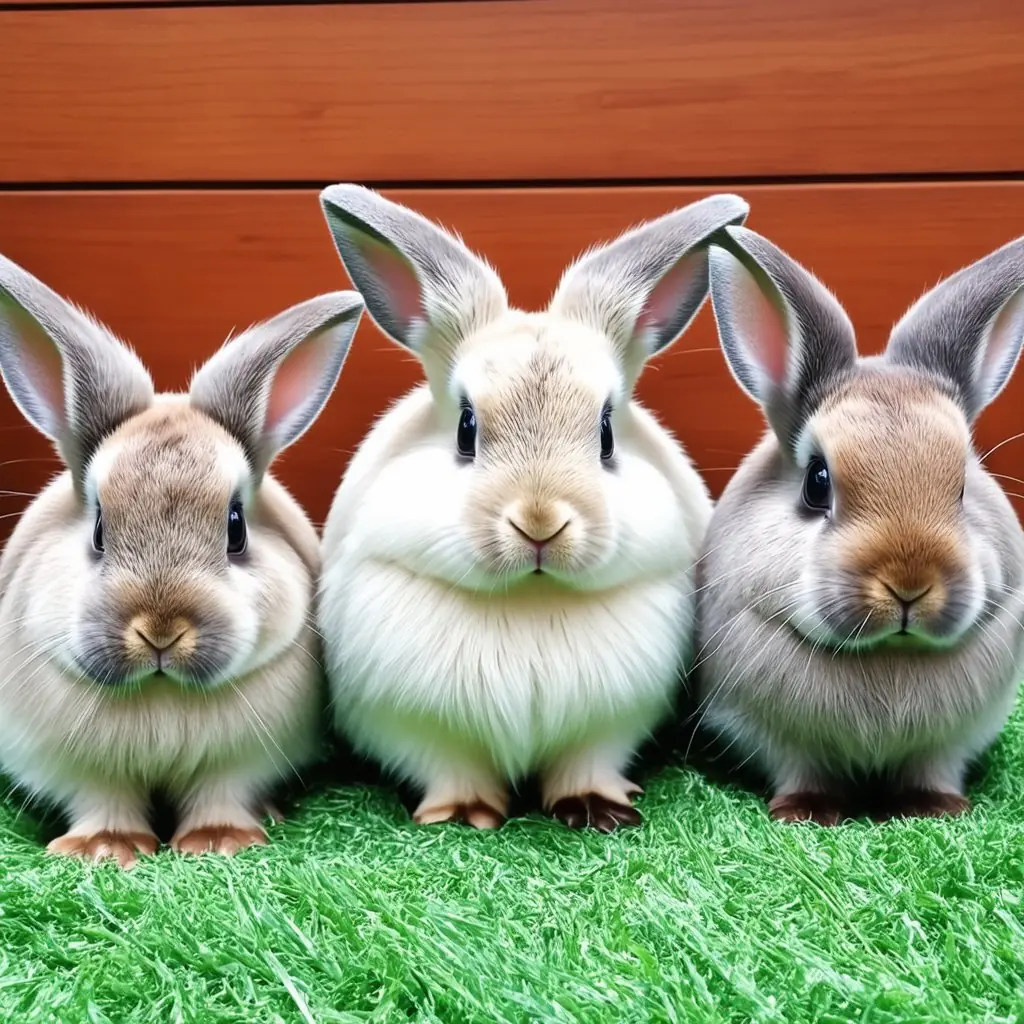
Lionhead Rabbit Personalities Compare Against Other Rabbit Breeds:
Let’s compare lion-head bunnies to other rabbit families. They are typically a smaller/medium rabbit breed, weighing around 2.5 to 3.75 pounds. However, their recognised size and friendly nature make them ideal pets for individuals and families living in apartments and flats. This does not mean that this breed is less attractive for houses with big spaces.
Lionhead rabbit’s beautiful personalities and friendly nature make them an ideal choice for all pet rabbit lovers. Therefore, when we compare lionhead rabbits with common breeds such as Holland lop or Netherlands dwarf rabbit And more like the lionhead has bolder, more lion-like characteristics but is just as playful and affectionate.
Lionhead Rabbits & other Rabbits comparison chart:
| Popular Rabbit Breeds | Size (Weight Range) | Colour Categories | Description |
| Lionhead Rabbit | 2.5 – 3.75 lbs (1.1 – 1.7 kg) | One of the smallest rabbit breeds, known for their compact bodies and round heads. | A small-sized breed with a characteristic “mane” of fur around the head, giving it a lion-like appearance. |
| Netherland Dwarf | 1.1 – 2.5 lbs (0.5 – 1.1 kg) | Self, Shaded, Agouti, Tan, Broken | One of the smallest rabbit breeds, known for their compact bodies and round heads. |
| Holland Lop | 2–4 lbs (0.9–1.8 kg) | Self, Shaded, Agouti, Tan, Broken | Sandy, Fawn, Steel Grey, Light Gray, White, Black |
| Mini Rex | 3 – 4.5 lbs (1.4 – 2.0 kg) | Self, Shaded, Agouti, Broken, Otter | Small-sized rabbits with a velvety, plush coat. |
| Dutch Rabbit | 4 – 5.5 lbs (1.8 – 2.5 kg) | Black, Blue, Chocolate, Tortoiseshell, Gray, Steel | A large breed with a white body and dark-coloured ears, nose, and feet. |
| Californian Rabbit | 8 – 10.5 lbs (3.6 – 4.8 kg) | White with Black or Chocolate Points | A large breed with a white body and dark-colored ears, nose, and feet. |
| Flemish Giant | 13 – 22 lbs (5.9 – 10 kg) | Sandy, Fawn, Steel Grey, Light Grey, White, Black | One of the largest rabbit breeds, with a docile and friendly temperament. |
So, we can consider that all other rabbits are bred for specific purposes, such as showing or fur production, but Lionhead rabbits are purely companion creatures. Their trademark is being friendly, fluffy, and lovable. Unlike some other rabbit breeds, lion-head bunnies have a variety of colours, from pure white to chocolate, agouti, and even bi-coloured patterns. We can say that they are like a tiny, furry rainbow of joy!
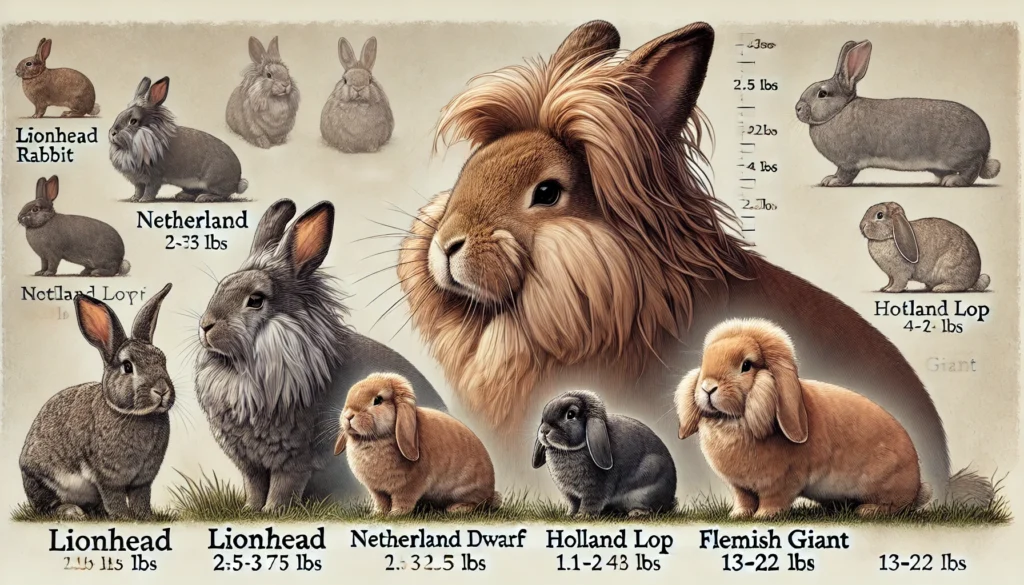
Lionhead pet rabbit’s vocalizations and noises Meanings:
Although Lionhead rabbits, like all rabbits, are generally silent creatures, they can make certain sounds or vocalizations to express their health or mood. You can better care for and communicate with them if you understand these sounds. The following are the meanings of the various Lionhead rabbit sounds.
- Grunting or Growling: It indicates irritation, anger, and some sort of fear.
- Purring sound Meaning: It means that your pet is feeling happiness and contentment.
- Thumping sound: When lionhead rabbits feel danger or fear, warn other rabbit family members of this situation.
- Whining or whispering Vocalization: This is the situation when your lionhead friend is stressed or feeling uncomfortable.
- Screaming sound: They act when your Lionhead bunny feels extreme pain or fear.
- Honking or Soft Oinking Sound: A sign of affection or excitement, often related to mating behaviour.
- Teeth Chattering (Loud and Rapid)Sound: Lionhead rabbits make this vocalization, which indicates pain or feeling unwell.
- Snorting or hissing sounds: when your lion-head bunny shows defensiveness and irritation.
- Clicking Noises (When Moving): This could happen when your Lionhead friend ages and feels joint pain or arthritis problems.
Health is Wealth Considerations for Lionhead Rabbits:
Lionhead rabbits have their own set of health problems to be aware of, just like any other pet. Despite their beauty, their long fur can occasionally cause issues if not correctly cared for. Hair mats and fur tangles may form if they are not routinely maintained. Regular vet appointments are essential to evaluate their health and discover potential issues early. To keep your Lionhead plesent and healthy, pay attention to their weight, teeth, and hair condition.
Some Common Health Issues of Lionhead Pets:
Howover there are some health issues may rabbits catches, some common mentoined below for awearness purpose.
Dental Health problems Lionhead pet friend:
Because lionhead rabbits’ teeth grow constantly, excessive growth may cause dental issues. For better natural tooth wear, serve them a diet high in hay (eighty percent of their diet). Keep an eye out for symptoms of enlarged teeth, such as drooling or trouble eating.
Grooming and Fur Maintenance of Lionhead Rabbits:
Skin infections can result from their thick hair becoming matted and trapping debris. To avoid mats and remove loose hair, brush their fur once a week or more frequently during the shedding season.
Digestive Issues for the Lionhead Family:
Rabbits with gastrointestinal stasis (GI stasis), a potentially fatal illness, have a slow or stopped digestive system. Make sure your diet is low in sugary foods and high in fiber (hay). Look for symptoms like decreased droppings, bloating, or lack of hunger.
Ear infections in Lionhead rabbits:
Due to their compact head structure, lionheads may develop ear infections. Regularly check their ears for redness, wax buildup, or foul odor, and clean them as advised by a vet.
Overheating Problems Lionhead bunny:
Lionhead pets dense fur makes them susceptible to heat stress, especially in warm climates. Please keep them in a relaxed, shaded environment and ensure they always have access to fresh water.
Eyes Infection Problems Lionhead pets:
Lionhead rabbit’s Long fur around their face can irritate their eyes, leading to infections. Trim the fur around the eyes if necessary and keep the area clean.
Parasite problems in lionhead bunnies:
Lionhead rabbits can suffer from mites, fleas, and other parasites. Use vet-recommended preventive treatments and check their skin regularly for signs of infestation.
Obesity issue faced by Lionhead rabbits:
Overfeeding or an improper diet can lead your lionhead friend to obesity, impacting their overall health and lifespan. Provide a balanced diet with limited pellets, fresh vegetables, and plenty of hay.
Nail and Paw Care:
Overgrown nails can cause discomfort and injuries. Trim their nails regularly and provide surfaces that encourage natural wear.
Vaccination and Regular Vet Checkups:
In some regions, rabbits need vaccinations against diseases like myxomatosis or Rabbit Hemorrhagic Disease (RHD). Make sure Regular vet checkups and ensure their vaccination if required.
By staying proactive with their care and monitoring for early signs of health issues, Lionhead rabbits can lead happy, healthy lives.
The Fluffy Duty of Caring for Your Lionhead Rabbit:
There is more to caring for a Lionhead rabbit than just giving it food and water. Particularly about their fur and living conditions, these cuddly little animals have particular requirements. But don’t worry; once you get the feel of it, it’s really easy!
Requirements of Daily Care for Your Pet Freind:
At first glance, Lionhead rabbits require a lot of exercise. Make sure they have a safe place to jump around every day since, despite their small size, they are active and inquisitive. Kindly do not put your pet in cage for longtime, allow them to go outside for a few hours each day so they can get some fresh air. Spend time with your bunny because they also enjoy being the centre of attention. Lionheads appreciate human interaction, whether by soft petting or being in their presence.
How to Groom Your Friend Lionhead Rabbit?
One of the most crucial responsibilities of Lionhead rabbits is grooming. To avoid mats and tangles, their long, fluffy mane needs regular care. Use a soft brush to gently comb through their fur at least a few times a week. To prevent fur accumulation, you may need to do this more frequently throughout the shedding season.
Please use a detangling brush or your fingertips to find any tangles. Therefore, preventing skin issues is crucial to maintaining your lion-head friend’s fur. You can ensure your pet’s comfort in this way.
Healthy Lionhead Pet Dietary Needs:
We know that to be fit and fine, every creature needs a balanced diet, so your pet friend Lionhead also needs a calculated balanced diet; their primary source of nutrition is fresh hay. So provide them fresh hay and supplements, which not only provide essential fibre but also maintain their teeth strong.
Therefore, to keep the diet more balanced, include fresh vegetables like leafy greens with a calculated amount of pellets and plenty of fresh water. But remember, do not include sugary or starchy foods because these things can lead to bad digestive systems.
Making a Sweet Bunny Home for your Sweet Lionhead Rabbit:
As a misconception, many pet rabbit lovers believe that rabbits may live in any old cage or hutch. However, your lionhead bunny is cute and delightful, so they are required to establish a clean and spare space cage or hutch for living. A thoughtfully designed habitat guarantees their happiness and well-being.
Living Indoors vs. Outside for Rabbit Lionheads:
Lionhead rabbits thrive in indoor environments, while some are kept outdoors. They are excellent home pets because of their petite size and gregarious disposition. Additionally, staying indoors shields them from inclement weather and other predators. Make sure the area is safe and secured so your Lionhead can not run away or get hurt if you decide to let them play outside.
Supplies and Accessories For Rabbit Home:
Pay attention to a spacious cage or playpen to make your Lionhead’s living space comfortable and beautiful. The cage should be large enough for them to move around freely, with areas for eating, sleeping, and going to the bathroom. Soft bedding is essential kindly avoid wire flooring, as it can hurt their feet. Provide plenty of toys to keep them entertained and mentally stimulated, as well as tunnels and hiding spots to satisfy their natural curiosity.
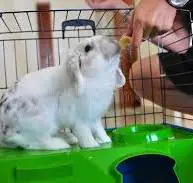
Lionhead Rabbit Training: Yes, You Can Train a Bunny!:
Do you believe that rabbits are untrainable? Rethink your assumptions! Due to their intelligence, lionhead rabbits may be litter-trained and taught simple directions with a bit of perseverance.
- Tips for Training Litters Box: Put a litter box in their cage or play area to start. Given their innate cleanliness, lionheads will begin using the box for their bowel movements if they receive sufficient encouragement. To help them learn where to go; put some of their droppings in the box. It could take some time for them to adapt completely, so have patience.
- Giving Instructions and Tricks: Lionhead rabbits enjoy learning new things and are intelligent. By rewarding them with food, you can teach them basic commands like “come, sit,” or “up” by making hand movements to indicate what you want to do from them.
- The secret is positive reinforcement: Reward them with a modest treat or some tender attention each time they obey a demand. You may even be able to teach them entertaining skills like standing on their hind legs or hopping through a hoop!
There are some pros & cons to having lionhead Rabbits:
A fascinating breed, lionhead rabbits are distinguished by their unique mane, which resembles a small lion. Here are the benefits and drawbacks of owning a Lionhead rabbit if you’re thinking about expanding your family.
Pros of Owning a Lionhead Rabbit:
- Adorable Look: Because of their opulent mane of fur around their head and neck, which resembles a lion, lionhead rabbits are easily identified. They are a favourite among rabbit lovers because of their unique shape.
- Tiny Size: The typical weight of a Lionhead rabbit is between 2.5 and 3.5 pounds, making them a compact breed. They are appropriate for people with restricted space because of the small dimensions.
- Friendly and Social Nature:Lionheads are renowned for their loving and lively nature. They develop close relationships with their owners and can even have pleasant encounters with kids if they are socialized properly.
- Intelligent and trainable creatures:Because of their high level of intelligence, these rabbits can be taught basic skills, like how to use a litter box and how to react to their names. They are therefore interesting pets to have around.
- Variety of Colors in Lionead Rabbits: Lionhead rabbits come in a wide range of colors and patterns, allowing potential owners to choose a rabbit that suits their aesthetic preference.
- Active and Entertaining Behaviour: They provide endless amusement because of their energetic and inquisitive attitude, which keeps them occupied. They enjoy playing with toys and discovering new places.
Cons of Owning a Lionhead Rabbit:
- High-Maintenance Personal Care: Regular brushing is necessary to avoid matting and knots in their long mane. If this is neglected, the rabbit may experience discomfort and skin problems.
- Particular Nutritional Requirements: A healthy diet of hay, fresh vegetables, and rabbit pellets is necessary for lionhead rabbits. To keep the rabbit healthy, owners must make sure they are meeting these nutritional requirements.
- At Risk for Dental Problems: Lionhead rabbits have teeth that keep developing, just like any other rabbit. Inadequate hay intake puts them at risk for dental issues, which can result in expensive veterinary care.
- Sensitive to Variations in Temperature: Extreme temperatures are not ideal for these bunnies. Careful temperature regulation is essential because of their thick fur, which can make them prone to overheating.
- Easily agitated and delicate: Because they are sensitive animals, lionhead rabbits may become agitated by loud noises, hard treatment, or abrupt changes in their surroundings. Their conduct and general health may be impacted by this.
- Possible Health Issues : Common rabbit diseases include respiratory problems, ear infections, and gastrointestinal stasis can affect lionheads. Frequent veterinarian examinations are necessary.
- Lifetime Dedication: Because Lionhead rabbits live for seven to ten years, owning one is a long-term commitment that calls for constant attention and devotion.
FAQs (Your Top Questions Answered):
1. Is it simple to train Lionhead rabbits?
Indeed! Despite what many people think, Lionhead rabbits are smart and can be taught basic tasks, like how to use a litter box and how to come when called. Training sessions are enjoyable and productive when positive reinforcement is used, such as snacks and kind words of praise.
2. Do other pets get along with Lionhead rabbits?
As previously said, Lionhead rabbits can get along with other pets if they are introduced properly and are kept under supervision throughout encounters. They gradually form bonds with other animals because of their kind and inquisitive disposition.
3. Can Lionhead rabbits survive in the open atmosphere?
Because of their small size and more delicate temperament, Lionhead rabbits are generally better suited for indoor living, while some individuals keep them outside. If you choose to put your bunny outside, make sure it’s in a secure location away from harsh weather conditions and potential predators.
